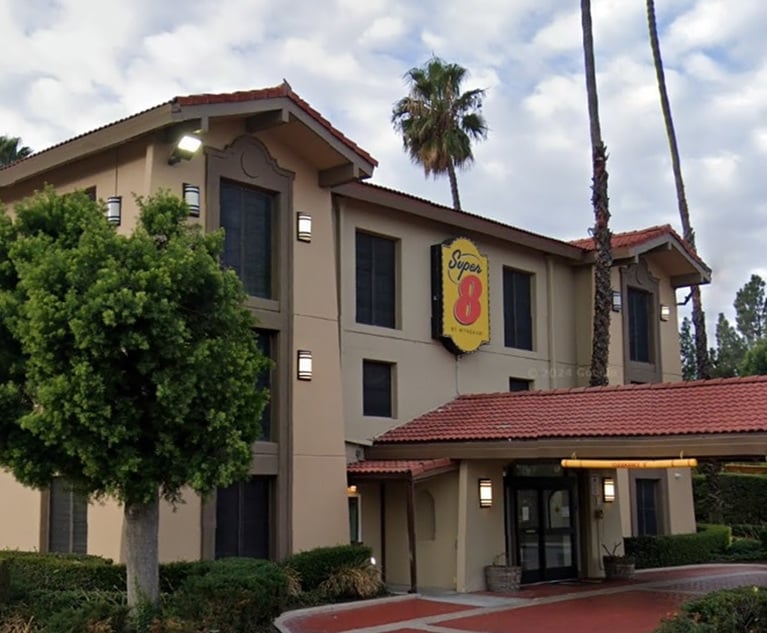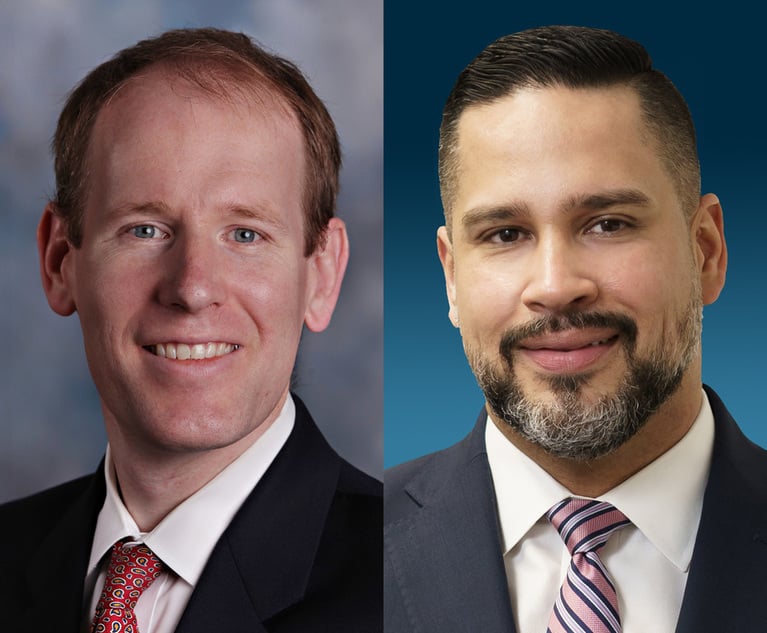 Credit: Nirmal/Adobe Stock
Credit: Nirmal/Adobe Stock2 Law Firms Disqualified Over Litigation Funding
The ruling serves as a reminder of the ethical questions that can arise when litigants accept funds from nonparties who are willing to pay the bills.
February 03, 2025 at 04:29 PM
4 minute read
What You Need to Know
- Two law firms disqualified from representing defendants in patent dispute based on their relationship with third party.
- Four attorneys from Banner Witcoff and one from Saiber are impacted by the ruling.
- Failure to obtain informed consent, interference in lawyers' professional judgment and communication between lawyers and the payer were cited to support disqualification.
Two law firms have been disqualified from representing the defendants in a New Jersey patent dispute because they were getting funding from a nonparty.
The ruling serves as a reminder of the ethical questions that can arise when litigants accept funds from nonparties who are willing to pay the bills.
U.S. Magistrate Judge Andre M. Espinosa of the District of New Jersey, in Harish v, Arbit, ruled that Saiber of Florham Park, New Jersey, and Banner Witcoff of Chicago could not continue representing two inventors, because the lawyers were being funded by a nonparty producer of medical test equipment—Lincoln Diagnostics of Decatur, Illinois—which had an interest in the outcome.
Don't 'Touch the Steering Wheel'
The case involves three people who were listed on the patent in 2018 as inventors of a device for conducting allergy skin tests without the discomfort from traditional methods using multiple injections.
Ziv Harish, a physician in Maine, was listed on the patent along with technology executive Isaac Rubenstein and physician Ehud Arbit, who are both from New Jersey. In 2020, Arbit and Rubenstein sold their shares in the patent to Lincoln in exchange for compensation, the complaint alleges.
In 2021, Harish sued Arbit and Rubenstein, claiming he is the only inventor of the device and seeking to remove the others' names from the patent, according to the complaint. Later, Harish moved to disqualify Saiber and Banner Witcoff from representing Arbit and Rubinstein, alleging that their bills are being paid by Lincoln. Espinosa granted the motion on Jan. 31.
"New Jersey RPC 1.8(f) outlines the circumstances where a lawyer can accept money on behalf of a client from a third party," said Noam J. Kritzer of Kritzer McPhee in Florham Park, New Jersey, who represents Harish. "If litigation is like driving a car, third-party funders are allowed to pay for gas but are not allowed to program the GPS or touch the steering wheel. Here, the attorneys at Banner Witcoff were serving Lincoln's interests instead of defendants' interests and the order explains in great detail the ethical violations the attorneys committed under NJ RPC 1.8(f)."
Failed Test
The order disqualified Marc Cooperman, Brian Apel, Jake Earl and Erik Maurer, all of Banner Witcoff, and Katherine Escanlar of Saiber. They did not respond to requests for comment about the ruling.
Harish argued in a motion to disqualify defense counsel that the motion should be granted because the defendants could not meet conditions articulated by the New Jersey Supreme Court in a 2009 ruling, In re State Grand Jury Investigation.
Espinosa, applying the 2009 decision, found that the arrangement between Lincoln and the defendants failed five parts of the six-part test from Grand Jury.
The parties to the payment arrangement could not demonstrate that the client gave informed consent; and they failed to demonstrate that there was no interference with the lawyer's independence of professional judgment or with the lawyer-client relationship, Espinosa wrote.
"Defendants present their respective declarations as evidence that the fee arrangement here has not interfered with their lawyers’ independent judgment. But this does not establish that Lincoln has not directed, regulated, or interfered with defense counsel’s professional judgment. The record makes clear that Lincoln is directing, regulating, and interfering with defense counsel’s professional judgment in its representation of defendants, and thus, the second Grand Jury condition is not satisfied," Espinosa wrote.
Also, the parties failed to demonstrate there was no communication between the lawyer and the third-party payer concerning the substance of representation of the client, and that once the third-party payer commits to pay for the representation of another, the third-party payer shall not be relieved of its continual obligations to pay without leave of court brought on prior notice to the lawyer and the client.
"Defendants present their respective declarations as evidence that the fee arrangement here has not interfered with their lawyers’ independent judgment. But this does not establish that Lincoln has not directed, regulated, or interfered with defense counsel’s professional judgment," Espinosa wrote. "The record makes clear that Lincoln is directing, regulating, and interfering with defense counsel’s professional judgment in its representation of defendants, and thus, the second Grand Jury condition is not satisfied."
NOT FOR REPRINT
© 2025 ALM Global, LLC, All Rights Reserved. Request academic re-use from www.copyright.com. All other uses, submit a request to [email protected]. For more information visit Asset & Logo Licensing.
You Might Like
View All



Trending Stories
- 1Public Notices/Calendars
- 2Wednesday Newspaper
- 3Decision of the Day: Qui Tam Relators Do Not Plausibly Claim Firm Avoided Tax Obligations Through Visa Applications, Circuit Finds
- 4Judicial Ethics Opinion 24-116
- 5Big Law Firms Sheppard Mullin, Morgan Lewis and Baker Botts Add Partners in Houston
Who Got The Work
J. Brugh Lower of Gibbons has entered an appearance for industrial equipment supplier Devco Corporation in a pending trademark infringement lawsuit. The suit, accusing the defendant of selling knock-off Graco products, was filed Dec. 18 in New Jersey District Court by Rivkin Radler on behalf of Graco Inc. and Graco Minnesota. The case, assigned to U.S. District Judge Zahid N. Quraishi, is 3:24-cv-11294, Graco Inc. et al v. Devco Corporation.
Who Got The Work
Rebecca Maller-Stein and Kent A. Yalowitz of Arnold & Porter Kaye Scholer have entered their appearances for Hanaco Venture Capital and its executives, Lior Prosor and David Frankel, in a pending securities lawsuit. The action, filed on Dec. 24 in New York Southern District Court by Zell, Aron & Co. on behalf of Goldeneye Advisors, accuses the defendants of negligently and fraudulently managing the plaintiff's $1 million investment. The case, assigned to U.S. District Judge Vernon S. Broderick, is 1:24-cv-09918, Goldeneye Advisors, LLC v. Hanaco Venture Capital, Ltd. et al.
Who Got The Work
Attorneys from A&O Shearman has stepped in as defense counsel for Toronto-Dominion Bank and other defendants in a pending securities class action. The suit, filed Dec. 11 in New York Southern District Court by Bleichmar Fonti & Auld, accuses the defendants of concealing the bank's 'pervasive' deficiencies in regards to its compliance with the Bank Secrecy Act and the quality of its anti-money laundering controls. The case, assigned to U.S. District Judge Arun Subramanian, is 1:24-cv-09445, Gonzalez v. The Toronto-Dominion Bank et al.
Who Got The Work
Crown Castle International, a Pennsylvania company providing shared communications infrastructure, has turned to Luke D. Wolf of Gordon Rees Scully Mansukhani to fend off a pending breach-of-contract lawsuit. The court action, filed Nov. 25 in Michigan Eastern District Court by Hooper Hathaway PC on behalf of The Town Residences LLC, accuses Crown Castle of failing to transfer approximately $30,000 in utility payments from T-Mobile in breach of a roof-top lease and assignment agreement. The case, assigned to U.S. District Judge Susan K. Declercq, is 2:24-cv-13131, The Town Residences LLC v. T-Mobile US, Inc. et al.
Who Got The Work
Wilfred P. Coronato and Daniel M. Schwartz of McCarter & English have stepped in as defense counsel to Electrolux Home Products Inc. in a pending product liability lawsuit. The court action, filed Nov. 26 in New York Eastern District Court by Poulos Lopiccolo PC and Nagel Rice LLP on behalf of David Stern, alleges that the defendant's refrigerators’ drawers and shelving repeatedly break and fall apart within months after purchase. The case, assigned to U.S. District Judge Joan M. Azrack, is 2:24-cv-08204, Stern v. Electrolux Home Products, Inc.
Featured Firms
Law Offices of Gary Martin Hays & Associates, P.C.
(470) 294-1674
Law Offices of Mark E. Salomone
(857) 444-6468
Smith & Hassler
(713) 739-1250






